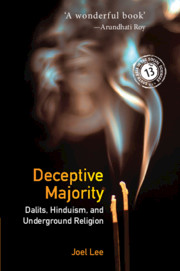5 - Hinduization and Its Discontents: Valmiki Comes to Lucknow
Published online by Cambridge University Press: 15 February 2021
Summary
Deepak asks me to come home for his grandmother's terahī, a rite and meal held on the thirteenth (terahī) day after her death. At the event, I hear one of Deepak's relatives call it not a terahī but a chālīsī—a ‘fortieth.’ He then corrects himself. Deepak explains that Muslims commemorate the dead on the fortieth day, whereas Hindus do it on the thirteenth. His relative had momentarily forgotten that their life cycle rites, which until recently followed the Muslim pattern, were now conducted in the style of Hindus. We sit in Deepak's house in a circle around a small fire while an Arya Samaj officiant—who turns out to be Balmiki like everyone else in the room—conducts the havan ceremony, reading Sanskrit prayers from a book.
After the ritual, Deepak and I repair to a side room and I notice a portrait hanging on the wall, an old, somewhat blurry photograph of a tall and imposing one-eyed man dressed in the green robes of a Muslim faqir. I ask if the portrait is of a holy man of some sort.
“That's my grandfather,” Deepak replies. “Muhammad Pahalwan.”
When India gained independence in 1947, the sanitation labor castes of Lucknow and its neighboring districts neither referred to themselves as Balmiki nor were referred to as such by others. They had predominantly musalmānā nām—names in a Muslim style—names such as Rukhsana, Nazira, and Allah Rakhi for women; and Nabbu, Ramzanu, and Anwar for men. “We were all Lal Begis,” explained a man born in 1923. “When I was eight, ten, twelve years old, there was not even mention of the name Valmiki.” The Lal Begis of Awadh entered neither Hindu temples nor—with a few exceptions—mosques. Religious life centered on the home, the neighborhood Lal Beg shrine, and Sufi centers like Dewa Sharif, where the panchayat of the 583 clan convened, and the tomb of Zohra Bibi in Rudauli, in the annual festival of which the Lal Begis performed a key ritual function (Nevill 1904: 53–54). Brahmins played no role, and Muslims a significant role, in Lal Begi sacraments: officiating at burials, rendering halal the sacrifice to Lal Beg, and reciting the fātiḥa at nuptials and innumerable domestic rites. Meat was invariably served at Lal Begi weddings.
- Type
- Chapter
- Information
- Deceptive MajorityDalits, Hinduism, and Underground Religion, pp. 163 - 210Publisher: Cambridge University PressPrint publication year: 2021

